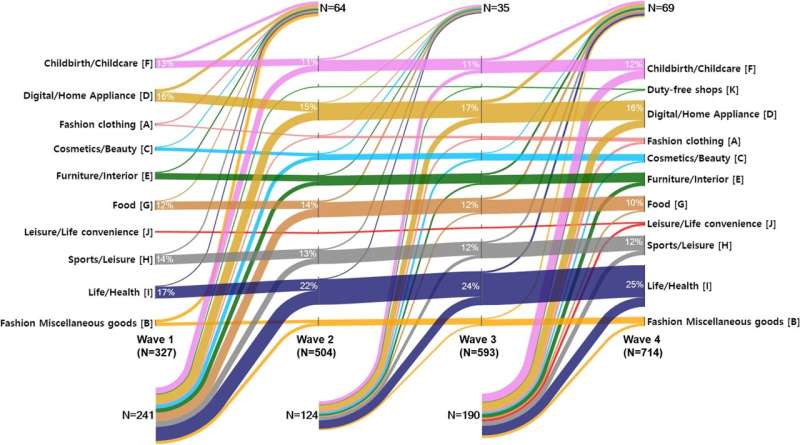This article has been reviewed according to Science X's editorial process and policies. Editors have highlighted the following attributes while ensuring the content's credibility:
fact-checked
trusted source
proofread
Research team validates big data's role in analyzing consumer behavior

The ongoing COVID-19 endemic phase has brought a consistent rise in international travelers. The Credit Finance Association revealed that overseas expenditures on personal debit cards from seven credit card companies had surged by approximately 38% year on year as of the third quarter of 2023.
Comprehensive insights into card usage and airport activities are crucial in understanding societal shifts during this transition to the endemic phase. Recent reports on utilizing machine learning technology to decipher evolving consumer behaviors have caused a stir.
A research team led by Professor Jonghun Kam and Ph.D. candidate Jiam Song in the Division of Environmental Science and Engineering at Pohang University of Science and Technology (POSTECH) applied an advanced statistical technique, Principal Component Analysis, to Big Data of online shopping-relating internet search activity volume data that is available at the NAVER DataLab platform.
This study aimed to understand how the COVID-19 pandemic has influenced people's online consumption psychology and behavior. This research has been published in Humanities and Social Sciences Communications.
Logging records activities within a system or website, and data logging involves recording and storing this information. Companies leverage data logging to scrutinize product search patterns and discern emerging shopping trends. Notably, a surge in search volume for a particular product indicates increased demand, prompting companies to devise new inventory management strategies.
Leading Korean search engine NAVER provides access to online shopping product search activity data through data logging. Utilizing this resource, the research team employed advanced statistical techniques such as principal component analysis (PCA) to extract major modes of search patterns over 1,800 online product search records from 2017 through 2021. Additionally, six indicators, including COVID-19 severity and government policy stringency, were used to grasp the relationship between the pandemic waves and consumption patterns.
The study found that during stringent periods of external activity limitations, such as those enforced by social distancing measures and heightened health concerns following the initial COVID-19 outbreak, online searches surged in the health and daily life category-products.
As time passed and government policies relaxed, people's fears about COVID-19 diminished, and online searches surged for duty-free and travel-related products. People's search patterns evolved in response to the severity of COVID-19 and changes in the government's prevention policies.
The research team elucidated this behavioral shift by introducing the React, Cope, and Adapt phases within the Reacting Coping Adapt (RCA) framework. During the React phase, individuals adjusted their buying behavior in response to perceived pandemic risks. In the Cope phase, they began embracing new purchasing patterns. Finally, they established and stabilized new buying habits in the Adapt phase.
Professor Kam emphasized the importance of big data, stating, "Understanding and predicting people's online consumption psychology and search patterns during pandemics and other global crises is crucial for business risk assessment and supply chain management."
More information: Jiam Song et al, Evidence of the time-varying impacts of the COVID-19 pandemic on online search activities relating to shopping products in South Korea, Humanities and Social Sciences Communications (2023). DOI: 10.1057/s41599-023-02183-y
Provided by Pohang University of Science and Technology


















